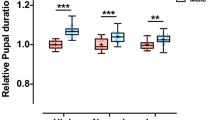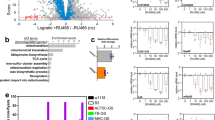Summary
The normal 24-h period of the circadian rhythms of locomotor activity and eclosion of Drosophila melanogaster is altered by changes in per gene dosage. Females with only one dose of per + or per s (the 19-h short-period mutant allele) or per 1 (the 29-h long-period mutant allele) have periods which are about 1–2 h longer than the corresponding females with 2 doses. Females with 3 doses of per + and males with 2 doses of per + or per s have periods which are 1/2 to 1 h shorter than the corresponding individuals without the extra dose. Males with three per + doses have periods which are about 1.5 h shorter than wild-type males; additional per + doses do not shorten period further. The observation that decreased per dosage lengthens period while increased dosage shortens period suggests that the long- and short-period mutations alter period by respectively decreasing and increasing per gene or gene product activity. The per + dosage results and the complementation behavior of per s indicate that the hypermorphic phenotype of per s results from increased activity of the per s gene product rather than an overproduction of per + product. This is the first report of such a mutant action in Drosophila.
Similar content being viewed by others
References
Feldman JF, Gardner GG, Denison R (1979) Genetic analysis of the circadian clock of Neurospora. In: Suda M, Hayaishi O, Nakagawa H (eds) Biological rhythms and their central mechanism. Elsevier: North-Holland Biomedical Press, Amsterdam, pp 57–66
Konopka RJ (1972) Circadian clock mutants of Drosophila melanogaster. Ph. D thesis, California Institute of Technology, Pasadena
Konopka RJ (1979) Genetic dissection of the Drosophila circadian system. Fed Proc 38:2602–2605
Konopka RJ, Benzer S (1971) Clock mutants of Drosophila melanogaster. Proc Natl Acad Sci USA 68:2112–2116
Konopka RJ, Pittendrigh CS, Orr D (1982) Reciprocal behavior and altered homeostasis and photosensitivity of clock mutants. Amer J Physiol (in press)
Kyriacou CP, Hall JC (1980) Circadian rhythm mutations in Drosophila affect short-term fluctuations in the made's courtship song. Proc Natl Acad Sci USA 77:6729–6733
Lifschytz E, Green MM (1979) Genetic identification of dominant overproducing mutations: the Beadex gene. Mol Gen Genet 171:153–159
Lindsley DL, Grell EH (1968) Genetic variations of Drosophila melanogaster. Carnegie Inst Washington Publ 627
O'Brien SJ, MacIntyre RJ (1978) Genetics and biochemistry of enzymes and specific proteins of Drosophila. In: Ashburner M, Wright T (eds) The genetics and biology of Drosophila, vol 2a. Academic Press, London, pp 395–551
Smith RF, Konopka RJ (1981) Circadian clock phenotypes of chromosome aberrations with a breakpoint at the per locus. Mol Gen Genet 183:243–251
Stewart B, Merriam J (1980) Dosage compensation. In: Ashburner M, Wright T (eds) The genetics and biology of Drosophila, vol 2d. Academic Press, London, pp 107–140
Young MW, Judd BH (1978) Nonessential sequences, genes, and the polytene chromosome bands of Drosophila melanogaster. Genetics 88:723–742
Author information
Authors and Affiliations
Additional information
Communicated by M.M. Green
Rights and permissions
About this article
Cite this article
Smith, R.F., Konopka, R.J. Effects of dosage alterations at the per locus on the period of the circadian clock of Drosophila . Molec Gen Genet 185, 30–36 (1982). https://doi.org/10.1007/BF00333786
Received:
Issue Date:
DOI: https://doi.org/10.1007/BF00333786




